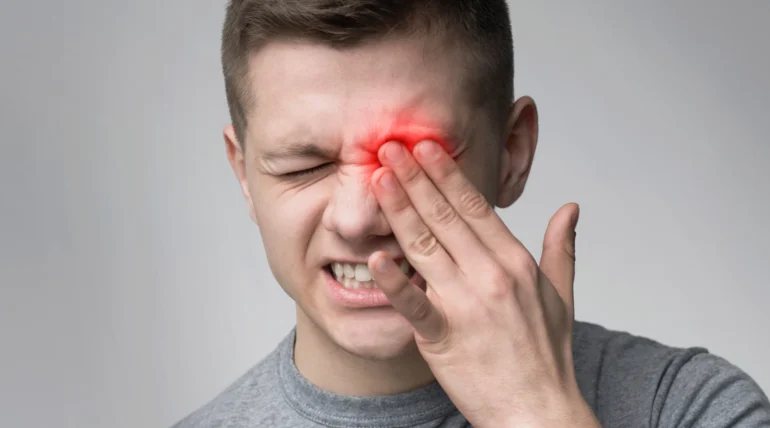
Your eyes are among the most delicate and vital organs in your body. They allow you to see and interact with the world, making vision one of the most cherished senses. However, because of their sensitivity and exposure, your eyes are also vulnerable to various injuries. Eye injuries can occur in many ways, from simple accidents at home to more severe incidents in the workplace or during sports activities. Understanding these injuries, how to prevent them, and what to do if they happen is crucial for maintaining good eye health.
Common Causes of Eye Injuries
Eye injuries can happen unexpectedly and in a variety of settings. Some of the most common causes include:
- Blunt Trauma: This occurs when the eye or the area around it is struck by an object, such as a ball, fist, or other hard items. Blunt trauma can cause bruising, bleeding, and in severe cases, damage to the internal structures of the eye.
- Penetrating Injuries: These are caused by sharp objects like glass, metal, or wood that can pierce the eye, potentially leading to serious damage. Such injuries often require immediate medical attention.
- Chemical Burns: Exposure to hazardous chemicals, including household cleaning products, can lead to chemical burns in the eye. Even a small splash can cause significant damage, leading to irritation, redness, pain, and sometimes vision loss.
- Foreign Bodies: Dust, sand, wood chips, and metal particles can enter the eye, causing discomfort and potential injury. If not removed promptly and carefully, foreign bodies can scratch the cornea and lead to infection.
- Radiation Exposure: Prolonged exposure to ultraviolet (UV) rays from the sun or other sources of intense light (such as welding equipment) can damage the eyes. This can result in conditions like photokeratitis, often described as sunburn to the cornea.
Signs and Symptoms of Eye Injuries
Recognizing the signs of an eye injury is critical for seeking timely treatment. Some common symptoms include:
- Pain or discomfort: Any persistent pain in or around the eye should be taken seriously.
- Redness or irritation: This can be a sign of an injury or infection.
- Blurred or double vision: Sudden vision changes require immediate medical evaluation.
- Sensitivity to light: This can indicate inflammation or damage to the eye.
- Swelling or bruising: Swelling around the eye or eyelid can result from trauma.
- Discharge: Pus or watery discharge can be a sign of infection or injury.
Preventing Eye Injuries
Prevention is always better than cure, and there are several steps you can take to protect your eyes from injury:
- Wear Protective Eyewear: Whether you’re playing sports, doing yard work, or working in a hazardous environment, wearing safety glasses or goggles is one of the best ways to prevent eye injuries. Ensure that your eyewear is appropriate for the activity and fits properly.
- Handle Chemicals Safely: Always use caution when handling chemicals, whether at home or work. Make sure you have adequate ventilation, and never mix chemicals that can create dangerous reactions. If a chemical splashes into your eye, flush it with water immediately and seek medical attention.
- Avoid Rubbing Your Eyes: If something gets into your eye, resist the urge to rub it, as this can cause further damage. Instead, try flushing it with clean water or saline solution.
- Be Cautious with Sharp Objects: Whether you’re using tools, knives, or even scissors, be mindful of where they are pointing. Accidents can happen quickly, especially if you’re distracted.
- Regular Eye Check-ups: Regular visits to an eye care professional can help detect potential issues before they become serious. It’s especially important if you experience any sudden changes in vision.
First Aid for Eye Injuries
If an eye injury does occur, it’s important to act quickly and appropriately:
- For Blunt Trauma: Apply a cold compress to reduce swelling, but do not apply pressure to the eye. Seek medical attention to rule out internal damage.
- For Penetrating Injuries: Do not attempt to remove the object from the eye. Cover the eye with a protective shield (like a paper cup) and seek emergency medical care immediately.
- For Chemical Burns: Rinse the eye with clean water for at least 15 minutes. If possible, use an eye wash station. Remove contact lenses if you’re wearing them, and seek medical attention immediately.
- For Foreign Bodies: Try to flush the eye with water. If the object doesn’t come out or if the discomfort persists, seek medical care. Avoid rubbing the eye.
Conclusion
Your eyes are precious, and protecting them should be a priority. By taking preventative measures and knowing how to respond in case of an injury, you can significantly reduce the risk of serious damage. Remember, prompt and proper treatment of eye injuries can prevent long-term complications and preserve your vision. Make eye safety a part of your daily routine, and encourage others to do the same. Your future self will thank you!




